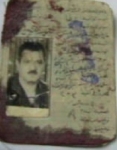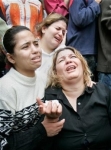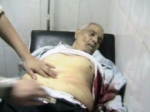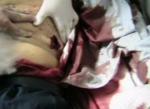24 May 2006
EGYPT : DEADLINE PASSES FOR INVESTIGATING CHURCH ATTACKS
 (Compass Direct) More than a month after Copts knifed in Alexandria, fact-finding team still unformedWith Cairo reeling from two weeks of clashes between thousands of police and demonstrators over the trial of two judges, Egypt appears to have forgotten its promises to investigate the April 14 stabbing of Christians in Alexandria.
(Compass Direct) More than a month after Copts knifed in Alexandria, fact-finding team still unformedWith Cairo reeling from two weeks of clashes between thousands of police and demonstrators over the trial of two judges, Egypt appears to have forgotten its promises to investigate the April 14 stabbing of Christians in Alexandria.
Egyptian leaders were quick to condemn the church knife attacks that left one Christian dead and more than a dozen wounded on April 14. In an effort to quell the ensuing two days of violent clashes, Egypt’s parliament announced the formation of a fact-finding committee, headed by Deputy Speaker of the People’s Assembly Dr. Zeinab Radwan.
The panel was charged with investigating the cause of the attacks and reporting its findings within 30 days. More than one month later, with 68 of those arrested during the Alexandria violence still imprisoned without charges, the committee has yet to be formed.
Many Copts are skeptical that the matter will be fully investigated.
“Even if a committee does meet, and even if they come out with a report, that report will not see the light of day,” Coptic Orthodox Metropolitan Wissa (ordained Copts use only their first names) told Compass.
Christians are also skeptical of government claims that a mentally unstable knife-wielder, Mahmoud Salahedin Abdul-Razik, had single-handedly attacked three churches on opposite sides of town all in the same morning. This version of events contradicted earlier police reports that three men involved in the attacks had been arrested.
“I don’t believe this for a second,” Metropolitan Wissa told Compass. “It was all pre-planned with cooperation of the security police.”
The guard who was supposed to be protecting the church allowed the assailant to escape from the scene of the crime by firing bullets into the air to stop the Copts from catching him, he added.
Eyewitnesses of the April 14 attack on Noshi Atta Girgis, who died after being stabbed as he was exiting the main gate of Al-Quidissin Church, said that the attacker yelled, “There is no God but Allah,” and called the Christians “infidels.”
Other church leaders, though more hesitant to criticize the government, were equally skeptical. “How did he [Abdul-Razik] go from one church to another with a knife and blood-soiled clothes?” Coptic Archbishop Anba Mussa asked in a recent interview with Agence France-Presse.
Violence erupted at Girgis’ funeral the next day when crowds of Muslims began throwing stones at the funeral procession and Christians responded in kind.
Chants of “with our blood, with our soul, we will sacrifice for you, Christ,” as well as the cross that the procession was carrying, were said to have provoked the Muslim attack.
“When the Muslim youths saw the cross in the sky, the animosity in their hearts became evident,” a Copt named Talat Megala told the New York Sun.
Coptic Bystanders Arrested
Feelings of anger against the government also extend to the way that officials handled security during the two days of violence in Alexandria’s Asafra district.
According to eyewitnesses, police indiscriminately arrested Coptic bystanders who happened to be in the area during the violent clashes.
“I panicked and ran towards the policemen for protection, since on the other side I could see a crowd of Muslims ready to attack,” one Coptic young man who was on his way to church on April 15 told Compass. “There were three other people near me, and the policemen caught us and started beating us cruelly.”Requesting anonymity for security reasons, the Christian said that he was loaded onto a police truck with other Copts. He heard an officer ask, “Are these 75? We need 75 people.”
“They were just catching anyone they could lay their hands upon,” the young man commented.
According to reports, police arrested 101 people over the course of the weekend, 54 Christians and 47 Muslims.
“It’s the policy of keeping the balances,” Metropolitan Wissa commented. He said that no matter who is actually responsible for the violence, “the government always arrests an equal number of Christians and Muslims.”
Many of the 33 released over the following two weeks reported mistreatment at the hands of Egypt’s security police.
One young man, whom police had grabbed and beaten as he was leaving church, said that he was blindfolded at the police station and asked why he had been arrested. “When I answered that I’d done nothing, I was told that I was lying,” the man said. “They threatened to electrocute me, burn me, and get my mother in to insult her.”
“They took off my shirt and poured water over me telling me it was kerosene.”
“You take your mother to church for the priest to [violate] her,” police told another man as they whipped him.
 Late on the night of April 15, after Girgis’ funeral, unknown vandals attacked Asafra’s Virgin Mary Church. The intruders set fire to the church office, destroying the ante-room used for baptisms and completely burning the church’s records.
Late on the night of April 15, after Girgis’ funeral, unknown vandals attacked Asafra’s Virgin Mary Church. The intruders set fire to the church office, destroying the ante-room used for baptisms and completely burning the church’s records.
Church staff confirmed to Compass that they immediately called the fire department, but that firefighters refused to come when they found out that a church was burning.
“When it burns down with you inside, we shall come,” fire department officials allegedly told church members over the phone.
History of Failed Justice
On the surface, the knife attack appeared to be no more than a new episode in an ongoing series of religiously motivated attacks against Egypt’s Coptic Christians.
Last October, three people died as thousands of Muslims in Alexandria demonstrated against a DVD of a play that they felt insulted Islam. In January this year, one Copt was killed when Muslims attacked a church in Luxor that was not officially registered with the government.
Disillusioned by the government’s failure to protect them last month, Copts are also aware that previous violence against them has often gone uninvestigated. Alexandria’s Christians are still waiting for the completion of a government investigation into last October’s violence; besides the three people killed, 150 others were injured.
After violence erupted between Christians, Muslims and police following the April 14 stabbings, politicians called for national unity in support of the country’s large Coptic Christian minority.
At least 39 Christian businesses were reportedly looted and one Muslim shop owner was killed while defending an employee during the clashes.
But the weekend violence was not a purely “Christian versus Muslim” affair. Copts said that members of Egypt’s fundamentalist Muslim Brotherhood, including 50 veiled women, joined the Christians for Girgis’ funeral.
 Towards the end of the second day of riots, a group of 3,000 Muslims and Christians joined together in a government-sponsored demonstration renouncing the attacks, Egyptian weekly Watani reported. Muslims then entered the Al-Quidissin church to ask for forgiveness, the newspaper said.
Towards the end of the second day of riots, a group of 3,000 Muslims and Christians joined together in a government-sponsored demonstration renouncing the attacks, Egyptian weekly Watani reported. Muslims then entered the Al-Quidissin church to ask for forgiveness, the newspaper said.
Many Copts blamed the government more than religious extremists for the violence, saying that the Egyptian leadership did not care about their security.
 “Hosni Mubarak, where are you?” read one Coptic protest banner outside Al-Quidissin church after the attacks, in a reference to Egypt’s president.
“Hosni Mubarak, where are you?” read one Coptic protest banner outside Al-Quidissin church after the attacks, in a reference to Egypt’s president.
Over New Year’s weekend six years ago in Al-Kosheh, a predominantly Christian village in Egypt’s Sohag province, 21 Coptic Christians were murdered. Dozens more Christians were wounded and more than 100 of their homes and businesses totally plundered in the three-day rampage.
When the courts eventually acquitted all the Muslim murder suspects, the judge accused local Coptic clergy of failing to stop the riots.
According to Metropolitan Wissa, who was Bishop of Baliana in Sohag at the time of the Al-Kosheh attacks, most attempts to investigate injustices against Copts have met the same fate as recommendations made by the Oteifi Committee in 1972.
This parliamentary committee had called for equal citizenship rights for Copts, but was ignored by the government.
“The killers of Al-Kosheh were acquitted,” read one banner carried by Copts at Girgis’ funeral last month. “What can we expect from Alexandria’s deranged man?”
In light of past failures to obtain justice, the simplest response to last month’s violence may be to “forgive and forget.” But that message will not appeal to many, including the families of the 34 Christians and 34 Muslims who are still in police custody.
Since Egypt renewed its notorious emergency law on April 30, the police can indefinitely hold them without trial or hearings.
17:58 Posted in Egypt | Permalink | Comments (0) | ![]() Facebook |
Facebook |



















The comments are closed.